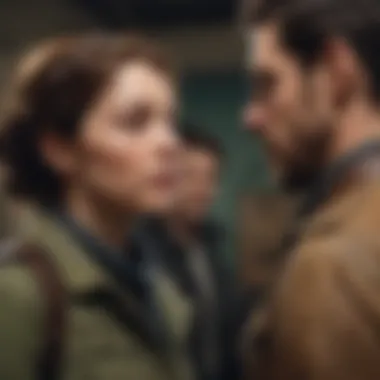An In-depth Analysis of the Series Vera


Overview of the Entertainment, TV Show, or Film Discussed
Vera is a British crime drama series that first aired in 2011. Adapted from the novels by Ann Cleeves, it features a tenacious detective chief inspector, Brenda Blethyn as Vera Stanhope. The series is set in Northumberland, a stunning region of the UK characterized by rural landscapes and remarkable coastlines. This setting plays a significant role in defining the mood and atmosphere of the series, enhancing its narratives through evocative backdrops.
The storyline revolves around Vera's investigations into various homicide cases, often examining complex human emotions and relationships. Each episode presents a self-contained plot while building on Vera’s character arcs and personal history over multiple seasons. This adds emotional depth to the procedural format, enabling viewers to invest in the character's journey.
Key Contributors
The genius behind Vera can be attributed to its consistent direction from various notable directors, including Paul Rutman, who has contributed as a writer and executive producer. Blethyn's performance elevates the show, offering a robust and multifaceted portrayal of the titular character.
Analysis and Critique
Evaluating Vera requires attention to its writing and direction. The series exhibits a keen balance of compelling narratives paired with rich dialogues. It challenges common tropes in crime dramas by focusing more on character psychology rather than sheer action.
The cinematography deserves special mention. It captures the stark beauty of Northumberland while effectively setting a somber tone aligning with the series’ thematic elements. Compared to similar shows, Vera stands out due to its intimate look into the lives affected by crime, making the story more relatable.
Thematic exploration is another strong point. The show often presents themes of loss, regret, and the moral ambiguities associated with crime, pushing viewers to contemplate deeper issues beyond the plot. Vera accomplishes this without becoming overly melodramatic, maintaining a thoughtful approach throughout its episodes.
Episode/Scene Breakdown
Notable episodes have played pivotal roles in shaping characters. For instance, Season 6, Episode 4, titled "The Deer Hunters", features Vera grappling with her past while solving a complex murder case. The backstory intertwined with present events creates an engaging narrative.
The impact of such scenes resonates throughout the series, highlighting character growth while keeping audiences intrigued about future developments.
Specific plot twists and revelations also stir discussions amongst viewers. The effectiveness of these moments lies in their ability to surprise without feeling contrived. Vera's character development is gradual, allowing viewers to grow alongside the characters.
Audience Reception and Ratings
Vera has received a generally positive reception from both critics and audiences. According to data from Rotten Tomatoes, it holds a solid rating, reflecting the series' broad appeal and quality. Audience reviews echo sentiments of appreciation for strong character development and atmospheric storytelling.
In social media discussions, platforms like reddit.com highlight fan theories and favorite episodes, showing how deeply engaged audiences are. Critical reviews often mention the standout performances, particularly by Blethyn, which signifies her contribution to the show's success.
Recommendations and Culmination
For those exploring crime dramas, Vera is a strong recommendation. Its grounded storytelling offers a refreshing take on the genre, appealing to both casual viewers and dedicated fans. Additionally, its rich character-driven plots provide ample material for those willing to look deeper.
"Vera's strength lies in its unique storytelling and character depth, making it both captivating and thought-provoking."
For further information, you can visit:
Overall, the article aims to shed light on the series' architecture, enriching the understanding of its artistry among audiences.
Overview of the Series
The exploration of Vera is crucial in understanding its impact in the realm of crime dramas. This section sets the stage for a comprehensive guide, asserting the series’ significance as more than a simple detective show. By outlining the basic elements of the series, readers can appreciate how the narrative unfolds and engage with the themes and characters effectively.
Foreword to Vera
Vera, which first aired in 2011 on ITV, has carved a niche for itself within the crime drama landscape. Created by writer Ann Cleeves, adapted from her novels, the series features the indomitable Detective Chief Inspector Vera Stanhope, portrayed by the acclaimed Brenda Blethyn. Set against the backdrop of Northumberland’s rugged landscapes, the series immerses viewers in an intricate web of mystery, character study, and emotional depth. The freshness in its storytelling and development contributes significantly to the continual interest among its audience.
Genre Classification
Vera fits neatly into the crime drama category, yet it transcends traditional boundaries. It does not simply revolve around the whodunit aspect; instead, it delves deeper into human emotions, moral dilemmas, and the consequences of crime. Key elements that define Vera include:
- Detective Protagonist: Vera Stanhope is not your archetypal detective. Her flaws make her relatable, and her approach to solving cases enhances the narrative.
- Complex Storytelling: Episodes often feature multi-layered plots where relationships among characters evolve, reflecting real-world challenges.
- Character Exploration: Rather than focusing solely on the crime, the series emphasizes the psychological aspects behind the characters, providing succinct reflections on society.
In essence, while Vera is identifiable as a crime drama, its exploration of deeper human themes and character complexities positions it as a show worthy of detailed analysis. It serves as an ideal precursor to the forthcoming sections that will unfold in this article.


Plot Synopsis
The Plot Synopsis serves as a crucial framework in analyzing the television series Vera. It provides an overview of the narrative structure and establishes context for the themes and character developments expressed throughout the series. This section is essential for understanding how the plot evolves over the seasons and the implications of various plot points on the series as a whole.
Season-by-Season Breakdown
In examining Vera season by season, we can see a distinct progression in both storytelling and character arcs.
- Season 1 introduces us to DCI Vera Stanhope, portrayed by Brenda Blethyn, who navigates crime scenes in Northumberland. Each episode presents a self-contained mystery, allowing viewers to acclimate to Vera's personality and investigation style.
- Season 2 builds on the foundation established in the first season with deeper exploration of Vera's emotional landscape. We see the introduction of recurring characters, enhancing the sense of continuity and connection.
- Season 3 escalates the stakes, featuring more complex crime narratives. Vera's relationships with her team, particularly with Aiden Healy, become more pronounced, highlighting themes of collaboration and trust.
- Season 4 explores the effects of past cases on present investigations. Subplots regarding Vera's personal life surface, adding layers to her character and showcasing the interplay between professional duty and personal turmoil.
- Season 5 sees Vera facing new challenges, both in her career and her relationships. The introduction of new technologies in investigations reflects contemporary issues within crime solving.
Through this breakdown, distinct patterns and developments emerge, showcasing how the plot serves as more than a vehicle for mystery, but also a pathway into exploring the depths of human emotions and relationships.
Key Story Arcs
In assessing the key story arcs in Vera, several recurring themes and character conflicts stand out. These arcs define not only individual seasons but also the progression of the series as a whole.
- Vera’s Internal Struggles: Throughout the series, Vera grapples with her past, particularly the tragic loss of her mother and its impact on her psyche. This personal conflict often feels more pressing than the cases she investigates, providing a haunting backdrop to her character.
- Team Dynamics: The evolution of relationships among the cast of supporting characters, including pathologist Dr. Malcolm Donahue and the various detective constables, reflects real-world complexities of teamwork. Each season presents challenges that test these bonds, ultimately leading to growth and deeper understanding among the characters.
- Evolving Crime Landscapes: By addressing contemporary issues such as cyber-crime, drug trafficking, and domestic violence, Vera remains relevant. It adeptly reflects the changing nature of crime and its implications for personal and community safety.
- Justice and Ethics: Vera often confronts moral dilemmas that challenge her understanding of justice. The storyline arcs are heavily laden with questions about right and wrong, pushing characters to confront their values in difficult situations.
In summary, the structural outline of Vera not only serves to engage the audience but also prompts deeper reflections on societal issues and personal ethics, making the narrative more impactful.
Character Analysis
The character analysis is crucial to understanding the depth of the television series "Vera." This segment goes beyond surface-level observations, revealing the complexities and intricacies of character portrayals throughout the series. The exploration of characters contributes significantly to the viewer's connection with the narrative. When audiences engage with well-rounded characters, it deepens emotional investment and enhances the overall viewing experience.
Characterization functions as a lens through which we examine moral dilemmas, personal conflicts, and relationships. By dissecting the significant personas within "Vera," we can understand their motivations and transformations across seasons, highlighting the engaging psychology that informs their decisions and actions.
Vera Stanhope
Vera Stanhope, portrayed by Brenda Blethyn, stands as the cornerstone of the series. Her character is a unique blend of vulnerability and strength, conveying a profound sense of determination as a detective. Vera's keen intellect and relentless pursuit of justice set her apart, making her an intriguing lead. Despite her rough exterior, there lies an emotional depth that is revealed during key moments in the series.
Her complex family history and the burdens she carries shape her worldview. Vera's relationship with her colleagues, especially with her assistant Aiden Healy, adds another layer to her character. These interactions reveal her leadership style and the balance between professional duties and personal connections. It demonstrates how Vera uses relationships as a tool in her investigative endeavors, making her both relatable and compelling.
Supporting Characters
The supporting characters in "Vera" play vital roles in enhancing the narratives and enriching Vera's story. Each character serves a purpose, whether as a foil to Vera or as integral parts of the cases she investigates. Aiden Healy, for instance, is not only her assistant but also acts as a grounding presence. His contrasting demeanor balances Vera's intensity, providing moments of levity and introspection.
Other recurring characters, such as pathologist Dr. Malcolm Donahue and various local police officers, contribute to the realism of the series. Through their diverse backgrounds and perspectives, the show paints a broader picture of its setting, creating a layered narrative that keeps viewers engaged.
Character Development Over Seasons
Character development in "Vera" shows a clear trajectory, particularly for Vera Stanhope. Over the seasons, viewers witness a gradual unveiling of her past, which deepens the audience's understanding of her character. The layers of her personality reveal vulnerabilities and strengths that resonate with real-life experiences, making her relatable.
Supporting characters are not static; they evolve alongside Vera, facing their own challenges and transformations. This evolution highlights the impact of their interactions with her, and how they grow in their roles. For example, Aiden's character demonstrates leadership potential and personal growth as he learns from Vera's methods.
As the series progresses, the interplay between characters becomes increasingly sophisticated. Relationships are tested and reshaped, showing how trauma and successes influence development. The rich character arcs contribute to the overall narrative, making each episode feel significant and interconnected.
"Character analysis reveals not only who a person is in the moment but also who they are becoming through their choices and relationships."
Themes and Motifs
Themes and motifs in Vera serve as the foundation upon which the entire series is constructed. They provide depth to the narrative and enrich the viewer's understanding of the characters and their choices. Each theme unveils layers of complexity that resonate with the audience, thereby elevating the viewing experience. Exploring these elements specifically reveals the nuanced storytelling and character arcs that define the series.
Justice and Morality
In Vera, justice is not merely a pursuit of the law; it's a philosophical journey. The series portrays its lead, Detective Chief Inspector Vera Stanhope, as a figure who constantly grapples with moral dilemmas. Cases often feature grey areas where the line between right and wrong blurs. This creates tension and prompts viewers to question their own perceptions of justice. The struggles she faces reflect a broader commentary on the human condition, suggesting that morality is subjective rather than absolute.


Moreover, Vera's personal background adds depth to her perspective on justice. Her past experiences shape her understanding, making her approach to solving crimes unique. This complexity makes her a compelling character who embodies the series' thematic exploration of justice.
Isolation and Connection
Isolation is a recurring theme throughout the series, both in physical settings and emotional landscapes. Vera often finds herself alone, surrounded by the stark landscapes of Northumberland. This sense of isolation mirrors her personal struggles and underscores the emotional weight she carries. Each case reveals how isolation affects not just her but also the victims and their families. The series presents a stark depiction of how social disconnects can lead to tragedy.
Conversely, connection emerges as a vital counterpoint. The relationships Vera forms—both with colleagues and community members—are crucial. They highlight the necessity of human connections in overcoming challenges. The series shows that while isolation can be an obstacle, it is through relationships that healing and understanding can begin to flourish. This duality serves as a reminder of the importance of connection in an often fragmented world.
The Role of Nature
Nature plays a significant role in Vera, acting as both a backdrop and a character in its own right. The landscapes of Northumberland are not only visually striking but also contribute to the themes of the show. The often harsh and unforgiving environments reflect the emotional turmoil of the characters, enhancing the narrative's intensity. The landscape can symbolize both beauty and danger, echoing the series' exploration of duality in human nature.
Additionally, the natural world in Vera serves as a means of reflection for the characters. Moments spent outdoors allow for introspection and personal growth. This interplay between character and environment symbolizes the complexity of their journeys, inviting viewers to engage more deeply with the series.
"In Vera, the landscape is not just a setting but a key component of the storytelling, echoing the characters' emotional states."
In summary, Vera employs themes of justice, isolation and connection, and nature to craft a rich narrative tapestry. This exploration not only makes the series stand out in the crime drama genre but also invites audiences to reflect on the intricate web of human experiences.
Production Insights
The production behind a television series often forms the backbone of its success, and Vera is no exception. Understanding the production insights offers invaluable context regarding the show's tone, narrative style, and character development. By examining the processes that shaped Vera, insights can be gathered into the vision of its creators and the collective effort that brought the series to life.
Behind the Scenes
The work behind the scenes is crucial in any television production. For Vera, this involves a blend of dedicated cast and crew working tirelessly to deliver authentic storytelling. Filming locations throughout Northumberland not only enrich the visual experience but also contribute to the overarching atmosphere of the show.
Moreover, the collaborative nature between writers, directors, and production staff plays a significant role in maintaining thematic continuity and character consistency. The intricate logistics of scheduling, location scouting, and crew mobilization aid in creating a seamless viewing experience.
Director’s Vision
The director's perspective is fundamental to the overall portrayal of the narrative. Vera has been directed by a series of talented individuals, with each interpreting the source material with a unique lens. The vision outlined by the director shapes not only scene execution but also how characters are portrayed, allowing for a richer, more immersive experience for the audience.
The choice of shots, pacing, and narrative focus are all influenced by the director’s goal to convey complex themes surrounding crime and personal relationships. This vision often persists through seasons, ensuring that the essence of Vera remains intact.
Cinematography and Setting
Cinematography in Vera brilliantly enhances the storytelling. The visual composition captures the rugged beauty of Northumberland, echoing the tumultuous personal and professional lives of the characters. Wide shots of the moors contrast with intimate close-ups that reveal the emotional nuances of characters, particularly Vera Stanhope.
The setting, a character in its own right, aids in building ambiance and tension. Careful consideration to lighting influences the mood in scenes, reinforcing thematic elements of isolation and connectivity. This meticulous attention to cinematographic detail helps elevate Vera within the crime drama genre, distinguishing it from other series.
"The unique blend of setting, character development, and direction makes Vera a standout in the landscape of modern television drama."
Cultural Impact
The cultural impact of Vera extends beyond mere entertainment; it reflects societal concerns, unique regional narratives, and audience engagement with crime drama. The series has not only charted notable ratings but has also influenced the crime genre in significant ways. By merging a meticulous narrative with well-defined characters, Vera adds depth to the discourse surrounding crime television. Its ability to touch on themes of justice and morality resonates with viewers, making it more than just another whodunit.
Reception by Audiences
Audience reception of Vera demonstrates a blend of admiration and emotional investment. The show has garnered a loyal fanbase, especially in the United Kingdom, where viewers resonate with the authenticity of the North East setting. Many viewers appreciate Brenda Blethyn's portrayal of the titular character, Vera Stanhope. This connection is evident in online discussions, where fans share their interpretations and theories about character motivations.
Critical feedback often highlights the slow-burn nature of the episodes, which some audiences find invigorating while others see as a drawback. Many regard Vera as a refreshing contrast to fast-paced modern thrillers. Audience ratings on platforms like IMDb and Rotten Tomatoes reflect a strong approval rate, showcasing that the series successfully meets viewer expectations for quality storytelling.
Critical Acclaim
Critics have showered Vera with praise for its compelling storytelling and character depth. The writing stands out for its complexity and realism; plots are not just about the crime, but also about the impact on the lives involved. Critical acclaim has been reflected in awards and nominations from esteemed organizations, highlighting its contribution to television. The series has won several accolades at the British Academy Television Awards (BAFTA), affirming its role in elevating the crime drama genre.


"Vera, with its rich characterizations and nuanced narratives, sets a new standard for crime drama on television."
The cinematography and atmospheric setting reinforce the critical view that Vera presents a unique interpretation of the detective genre. Critics have noted that the show is characterized by its strong portrayal of the region, allowing the location to become an integral part of the story—an element that is often overlooked in other series.
In summary, Vera occupies a unique space in contemporary television, offering a mix of audience engagement and critical validation. Its cultural significance will likely shape discussions in the realm of crime dramas for years to come.
Comparison with Other Crime Dramas
Understanding the landscape of crime drama television allows for a deeper appreciation of Vera. This series does not exist in a vacuum. It interacts with various traditions within the genre while carving out its unique space. Comparing Vera with other crime dramas provides insight into its thematic strengths and storytelling choices, lending a clearer perspective on what sets this show apart.
British Crime Television
British crime dramas have a distinct style characterized by their pacing, emphasis on character development, and often, a moral complexity that challenges viewers. Vera, set in the North East of England, embraces these traits. The melancholic landscapes of Northumberland serve as a silent character in the series, contributing to the overall tone. This connection to the environment is reminiscent of shows like Broadchurch and Happy Valley, which also use their settings to amplify narrative tension.
Vera stands out in how it develops its protagonist, DI Vera Stanhope, a figure whose flaws and depth resonate with audiences. Unlike other characters in British crime shows, who may bear stereotypical characteristics, Vera is often depicted as flawed, human, and relatable. Her intelligence is matched by her vulnerabilities, making her a more complex figure than many standard crime-solving archetypes.
The series also maintains a focus on procedural elements but does not shy away from addressing the emotional impacts of crime on victims and their families. This approach allows Vera to navigate themes of loss, grief, and resilience. While shows like Sherlock prioritize clever plots and high-stakes scenarios, Vera opts for a more subdued, human approach.
Global Perspectives
In exploring Vera's position on the global stage, it is important to note how crime dramas can reflect cultural differences. For instance, American crime dramas like True Detective tend to embrace a more sensationalist approach, frequently intertwining crime with moral ambiguity and psychological elements. Conversely, Vera tends to root its narrative in everyday realities, focusing more on the community and personal connections involved in each case.
One can draw parallels with international shows, such as The Bridge (Bron) from Scandinavia, which similarly emphasizes complex character relationships and societal issues. This focus on relational dynamics is key in depicting how crime weaves through individual lives rather than existing solely as a plot device.
Future of the Series
The examination of the future of Vera is paramount in understanding its legacy and potential trajectory. With viewers deeply invested in the characters and intricate plots, continual discourse exists around what comes next. Speculating on future seasons allows fans to engage with the narrative in a fresh way, considering how character arcs may evolve and how unresolved storylines might be addressed.
Speculation on Future Seasons
As the show enters its next phases, speculation abounds regarding potential developments. Given the robust foundation established by previous seasons, several directions seem plausible.
- Character Development: Vera Stanhope, portrayed by Brenda Blethyn, has shown immense growth, but further exploration of her past could deepen the audience's understanding. Additionally, supporting characters may receive enhanced backstories, enriching their roles in ongoing investigations.
- Plot Twists: The show has a history of surprising viewers with unexpected turns. Future seasons may introduce new adversaries or challenges for Vera, pushing her to confront her own vulnerabilities more intensively.
- Societal Issues: As contemporary society continues to evolve, it is likely that Vera will weave current issues into its narrative. This can provide a more relatable backdrop for the audience, connecting crime stories with real-world complexities.
The potential for new settings or locations to feature in the series is another intriguing notion. As the filming locations often reflect regional identity, introducing fresh environments could add to the storytelling depth.
Evolving Audience Expectations
Viewing habits have changed significantly over the years, influenced by technology and streaming services. This evolution shapes audience expectations in numerous ways:
- Binge-Watching Culture: The phenomenon of binge-watching has led audiences to expect tighter narratives with fewer fillers. As a result, Vera may need to maintain a brisk pace and tightly woven plots that sustain interest across episodes.
- Diverse Storytelling: Modern viewers often appreciate varied perspectives in storytelling. Expanding the focus to include diverse characters or narratives can resonate well with a broad audience.
- Character Complexity: Today's audience values multi-dimensional characters who exhibit growth over time and face realistic dilemmas. The challenge lies in crafting arcs that continue to feel authentic and engaging.
Understanding the trajectory of Vera not only informs fans about what they might see next but also highlights the importance of adaptation in television storytelling.
Finale
The conclusion of this article serves as a critical reflective point on the series. It encapsulates the importance of Vera within the crime drama genre. As a character-driven show, it brilliantly intertwines intricate storytelling with emotional depth, gaining both audience engagement and critical acclaim.
Final Thoughts on Vera
Vera is more than just another crime drama. It presents complex characters navigating moral dilemmas juxtaposed with personal struggles. The portrayal of DCI Vera Stanhope as a flawed yet committed investigator adds depth to the narrative. Her character serves as a lens through which viewers experience the weight of responsibility that law enforcement carries.
The series also showcases a unique backdrop of Northumberland, integrating local geography into its storytelling. This connection to place enhances its authenticity. The fine balance of personal and professional challenges reflects the reality faced by many in similar fields. Overall, Vera succeeds by maintaining high standards of quality in writing, acting, and production.
Legacy of the Series
The legacy of Vera lies in its influence in the crime drama landscape. It has set a benchmark for future series in terms of character development and narrative complexity. The show has inspired discussions on important themes such as justice and moral responsibility.
"Vera remains a touchstone for audiences looking for a deeper connection with its characters and storylines. It reshapes the expectations of a typical crime genre, making it a must-watch for enthusiasts."
The show has also opened doors for similar adaptations, reinforcing the necessity for strong female leads in what has traditionally been a male-dominated genre. As viewers expect more sophisticated narratives and relatable characters, Vera will surely influence upcoming series aiming to replicate its success.







